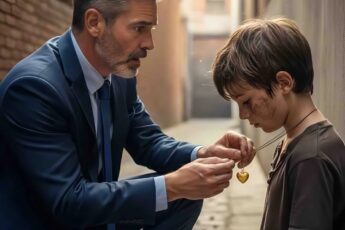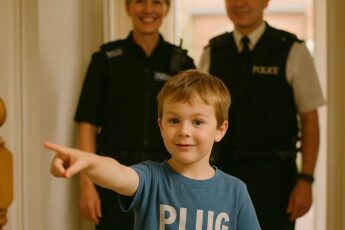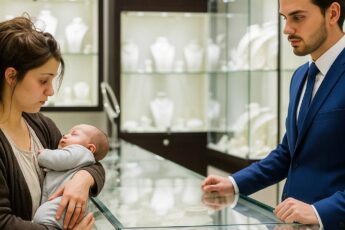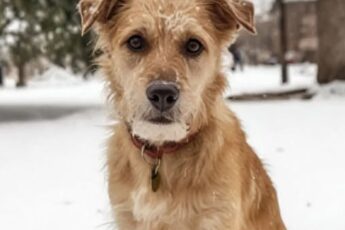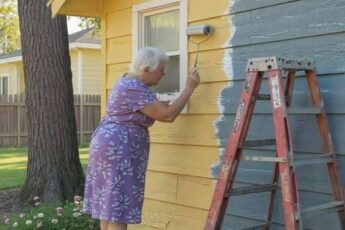The night my world shattered, the air smelled faintly of lavender detergent and burnt toast. My mother had been making herself a late snack, the bread left too long in the toaster, edges charred. That bitter smell clung to her words — words that sliced into me and never left:
“If you’re going to keep that baby, you can’t stay here. I won’t have it.”
I was seventeen. Standing in our kitchen, my heart hammering, my throat locked as I tried not to cry.
My father leaned in the doorway, arms crossed, his silence heavier than my mother’s rage. He wouldn’t even look at me — and that rejection hurt most of all. In his eyes, I saw shame. Disappointment. Disgust.
My hand drifted instinctively to the small curve of my belly. Four months along. Barely showing — but no longer hidden by baggy sweaters. I had dreaded this moment, yet a tiny part of me had hoped they might soften, might remember I was still their daughter.
I was wrong.
That night, with nowhere else to go, I packed a duffel bag — a few clothes, a toothbrush, my schoolbooks, and the folded sonogram tucked between notebook pages.
My parents didn’t stop me. My mother turned her back. My father lit a cigarette on the porch, the glow of it flaring against his stone-cold face. The door clicked shut behind me, and with that sound, I was no longer their child.
I walked for hours under the orange glow of streetlamps in our small town. The air was cool, shadows stretching across empty sidewalks. My steps grew heavier with every block. Where could I go?
My best friend’s family would never take me — too strict, too religious. The boy who had helped create this life inside me had already vanished the moment I told him. “I’m not ready to be a dad,” he’d said, as if I were ready to be a mom.
By midnight, I found myself in the park, curled on a bench with my bag clutched to my chest. Fear twisted in my stomach, louder than hunger. For the first time in my life, I was utterly alone.
And then… she appeared.
A figure moved down the path, walking with surprising energy for someone clearly well past seventy. She wore a long purple coat, mismatched gloves — one red, one green — and a scarf wound around her neck three times. A wide-brimmed hat shaded her silver curls, and she pushed a little cart covered in stickers and trinkets that jingled with every step.
She spotted me instantly. And instead of crossing the street — the way most would when seeing a teenage girl alone at night — she came straight toward me.
“Well now,” she said brightly, her voice a curious mix of sharpness and warmth. “You look like a little bird that’s flown into the wrong tree.”
I blinked at her, unsure how to answer. “I… I don’t have anywhere to go.”
“Don’t we all feel that way sometimes,” she mused, settling herself on the bench beside me. “Name’s Dolores. But most folks call me Dolly. What’s yours?”
“…Marissa.”
“Pretty name,” she said, tugging her gloves tighter. Her eyes — piercing blue, startlingly clear — studied my face, then flicked down to my stomach. “Ah. So that’s the story.”
Heat rushed to my cheeks. “My parents kicked me out,” I whispered.
“Then they weren’t parents at all,” she said firmly. “Their loss. Come on now, up you get. You’re coming with me.”
I blinked. “I don’t even know you.”
She chuckled. “And yet, here I am — the only one offering you a roof. Don’t worry, child, I may be eccentric, but I’m not dangerous. Ask anyone in town. I’ve been feeding strays for decades. Cats, dogs, people — doesn’t matter. You happen to be both.”
Despite myself, I almost laughed. And after so many hours of despair, that tiny laugh felt like breathing again.
Against every instinct about trusting strangers, I stood and followed her. Something about Dolly radiated safety, even through her quirks.
Her house sat at the edge of town, a sprawling Victorian painted turquoise with sunflower-yellow shutters. Wind chimes danced on the porch, ceramic gnomes lined the walkway. When she opened the door, I was hit with the scent of cinnamon and the sight of glorious chaos: jars of buttons, towers of books, blankets in every color.
“Make yourself at home,” she said, hanging her coat on a bird-shaped hook. “Tea?”
I nodded, too stunned to speak.
Minutes later, she set steaming mugs and a plate of cookies on the table. She studied me, her sharp eyes softening.
“You’ve been dealt a cruel hand,” she said gently. “But life… life has a way of giving second chances in the most unexpected packages.”
I stared at my tea. “I can’t do this. I can’t raise a baby alone. I can’t even finish school now.”
“Of course you can,” she said briskly. “I was a schoolteacher for thirty years. You’ll finish. And as for the baby — no one should do it alone. Lucky for you, I’ve got too much house and too much time. We’ll make a plan.”
Tears stung my eyes. “Why? Why would you help me? You don’t even know me.”
Dolly shrugged, sipping her tea. “Because once, a long time ago, someone helped me when I thought my life was over. Kindness is a debt you spend your life repaying. Besides, I like babies. And I like stubborn girls who refuse to give up, even when the world tells them to.”
That was the night my life began again.
The first morning I woke up in Dolly’s house, sunlight streamed through lace curtains, and for the first time in weeks, I didn’t feel like I was drowning. On the nightstand beside the bed was a knitted blanket folded neatly, a glass of water, and a note in loopy handwriting:
“Breakfast is on the stove. Don’t argue — eat.”
It made me smile through tears.
Days turned into weeks, and weeks into months. Dolly slipped into my life like she’d always been meant to be there. She taught me how to crochet baby booties, how to stretch a meal out of beans and rice, and how to laugh at things too small to cry about.
“You’re stronger than you think,” she’d say whenever fear gripped me. “And that little one in your belly is stronger still.”
When the time came and I gave birth, Dolly was right there, holding my hand tighter than anyone. She was the first to hold my son after me, whispering, “Welcome to the world, little warrior.”
I named him Gabriel. My angel.
Dolly became his grandmother in every way that mattered. She was at every milestone: his first steps across her living room rug, his first words shouted from her porch, his first day of school when she cried harder than I did.
And me? I finished high school, then college, because Dolly refused to let me quit. She proofread my essays, quizzed me before exams, and celebrated every victory with homemade pie.
Years later, when Gabriel turned ten, I caught him sitting on Dolly’s lap, her silver hair wild, her hands wrinkled but steady as she showed him how to thread a needle. He looked up at her with pure devotion and said, “Grandma Dolly, you saved us.”
She chuckled, ruffling his hair. “No, child. You saved yourselves. I just gave you a place to land.”
I stood in the doorway, watching them, my heart swelling. She had been right all along: life does give second chances — sometimes wrapped in mismatched gloves and a purple coat.
The night my parents abandoned me, I thought my life had ended.
But in Dolly’s kitchen, over tea and shortbread cookies, a new life quietly began.
And it’s one I wouldn’t trade for anything.

